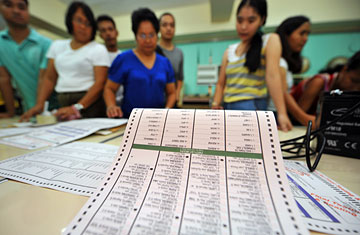
Philippine election officials test a vote-counting machine in Manila's financial district on May 6, 2010
Residents of a country notorious for its political volatility, Filipinos have grown accustomed to seeing their democracy rocked by threats of coups or widespread corruption. On May 5, just five days before the slated national election, Gregorio Larrazabal, head of the Philippine Commission on Elections, known as Comelec, insisted that "we will have an election on May 10." But the reason for his attempt to calm doubts about it had nothing to do with unrest or violence. It's to do with machines.
This year's national elections are meant to be the country's first-ever electronically automated polls. Comelec contracted with a Venezuelan technology manufacturer, Smartmatic, to provide some 76,000 precinct-count optical scan, or PCOS, machines for Monday's vote. But with technological and logistical snafus plaguing the project from the outset, critics believe Comelec has made the voting process worse, not better.
In the latest twist in the country's electoral saga, a May 5 recall of improperly configured memory cards from all 76,000 machines spurred rumors that the vote may be postponed. That, coupled with a statement the same day by a presidential spokesperson that the glitches may necessitate delaying the elections, led to widespread calls to stick with the established May 10 date, lest the elections fall into disrepute as they often have in the past. "Elections must push through ... as mandated by law," said presidential front runner Benigno "Noynoy" Aquino III in a statement issued later that day. "Our people want new leadership."
Many groups had speculated that the announcement about a possible election delay was part of a ploy by current President Gloria Macapagal-Arroyo to remain in power; she is barred by the country's constitution from serving another term. Her presidency has been strewn with scandals, including accusations (which she has denied) that she rigged the 2004 election that returned her to the presidential palace. Many surmise that she is seeking to retain political power to avoid prosecution for her purported crimes. Her office has since backed down and clarified that it wants the elections to go ahead as scheduled. Still, Aquino expressed concern at the possibility of a postponement, which he said would bring the nation closer to "a potentially disastrous crisis of a leadership vacuum on June 30," when Arroyo is due to step down from office.
A report by Eurasia Group, a New York City–based political-risk consulting firm, reaffirmed that the vote will go ahead but said it expects technical problems with the machines to trigger disturbances at the local level. Politically motivated violence is a common occurrence in Philippine politics — last November's massacre of 57 people affiliated with an opposition candidate in the southern province of Maguindanao served as a grisly illustration of the country's guns-and-goons notoriety. Potential instability in the polls won't be helped by Comelec's having told the press that it anticipates that machines destined for far-flung areas such as Basilan and Sulu, among the more infrastructure-bereft and insurgency-ridden islands in the archipelago, may arrive as late as the morning of election day.
Comelec insist that elections can and will proceed as planned on May 10. Smartmatic Asia Pacific president Cesar Flores has called complete failure of all the machines "impossible." But Danny Magbual, spokesman for the Manila-based election watchdog group National Citizens' Movement for Free Elections (NAMFREL), remains skeptical. "They should do what they can, but they should be honest in regard to which areas they cannot," he says. Because of the recurrent problems Comelec has faced in its $160 million undertaking, Magbual says the general public has already lost faith in the automated system. While there is a contingency plan in place to allow for a manual count of 30% of the votes, NAMFREL and other groups have urged that preparations be made for a full manual count. They have appealed to the Philippine Air Force and private corporations to help ensure that the 76,000 replacement memory cards reach all corners of the impoverished nation.
Filipinos have grown used to hoping for the best but expecting the worst, and most believe that a totally smooth election would be a logistical miracle. Brother Clifford Sorita, chief of a church-based electoral watchdog, is keeping his faith in the automated polls. "The country is experiencing the birth pangs of doing something new," he says. "What we need to do is see how to remedy the situation, postulate and move forward." Indeed, as observers anticipate numerous challenges in the days ahead, everyone knows the real work will begin only after the polls take place. "As long as people are able to vote and cast their ballots, an election has been held," says Magbual. "Whether or not there is credibility in the results is a different story."
